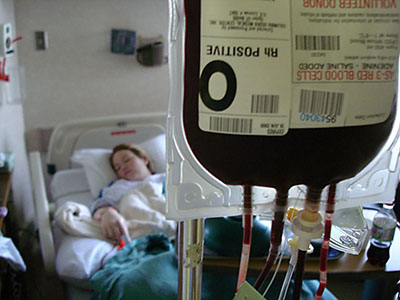Saskatchewan Transfusion transmitted injuries surveillance System (TTISS)

Saskatchewan Transfusion Transmitted Injuries Surveillance System (SK TTISS)
Blood Safety Contribution Program (BSCP)
The Public Health Agency of Canada (PHAC) has established the Blood Safety Contribution Program (BSCP) as part of its surveillance system. Hospitals in all provinces and territories voluntarily report adverse transfusion reactions to the BSCP.
The BSCP collects de-identified data on adverse reactions related to the transfusion of blood components (red blood cells, platelets, plasma and cryoprecipitates) and blood products (plasma derivatives). The surveillance information collected through BSCP is used to identify trends in adverse reactions at the national level. The overarching goal of BSCP is to improve transfusion processes and maximize patient safety in Canada.
Saskatchewan has actively participated in the BSCP – Transfusion Transmitted Injuries Surveillance System (TTISS) surveillance program since 2004. Every year, a summary report of the TTISS data in Saskatchewan is prepared. The report provides information to the hospitals and to the transfusion medicine specialists in Saskatchewan about adverse transfusion reactions.
Saskatchewan Transfusion Transmitted Injuries Surveillance System (SK TTISS)
SK TTISS is committed to the development of a comprehensive program for reporting adverse transfusion reactions in Saskatchewan. The Saskatchewan Health Authority, the Saskatchewan Transfusion Medicine program and the Transfusion Medicine Discipline Committee support SK TTISS.
Resources
Programs
What’s Popular
- About Us
- IVIG Dose Calculator – Based on Adjusted Body Weight
- Prenatal Testing and Prevention of Alloimmunization in Mothers of Saskatchewan (PRAMS) Program
- Saskatchewan Immune Globulin Stewardship Program
- Saskatchewan Transfusion Adverse Event Report Form (SHA 0481)
- Transfusion Best Practice Recommendations
- Transfuse Wisely Poster
- Using Blood Wisely – Intervention Toolbox
- Visual Inspection Tool – Canadian Blood Services
Useful Links
- Canadian Agency for Drugs and Technologies in Health (CADTH)
- Canadian Blood Services
- Canadian Blood Services Professional Education
- Canadian Immunodeficiencies Patient Organization
- Canadian Society for Transfusion Medicine (CSTM)
- Choosing Wisely Canada
- HAE Canada Website
- Jehovah’s Witnesses
- National Advisory Committee on Blood and Blood Products
- ONTraC – Ontario Transfusion Coordinators
- ORBCoN – Ontario Regional Blood Coordinating Network
- REDCap
- Saskatchewan Bleeding Disorder Program
- SaskBlood SharePoint
- Society for the Advancement of Blood Management (SABM)
- Treat the Bleed
